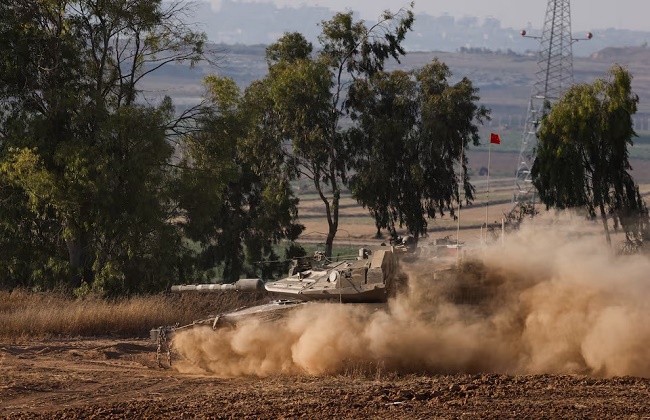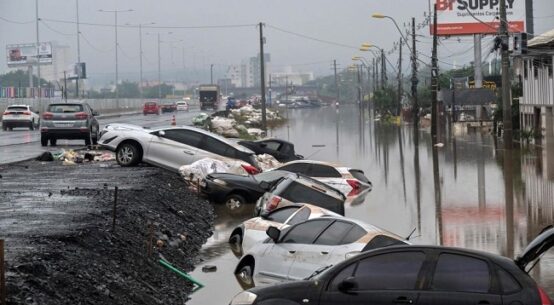
Israeli forces advanced further on Sunday into the Shejaia neighbourhood of northern Gaza and also pushed deeper into western and central Rafah in the south, killing at least six Palestinians and destroying several homes, residents said.
Israeli tanks, which moved back into Shejaia four days ago, fired shells towards several houses, leaving families trapped inside and unable to leave, the residents said.
Speaking at the start of the weekly cabinet meeting on Sunday, Israeli Prime Minister Benjamin Netanyahu repeated his position that there was no substitute for achieving victory in the war against Hamas.
“Our forces are operating in Rafah, Shejaia, everywhere in the Gaza Strip. Dozens of terrorists are being eliminated every day. This is a difficult fight that is being waged above ground, sometimes in hand-to-hand combat, and below ground as well,” Netanyahu said.
“We are committed to fighting until we achieve all of our objectives: Eliminating Hamas, returning all of our hostages, ensuring that Gaza never again constitutes a threat to Israel and returning our residents securely to their homes in the south and the north,” he added.
The Israeli military said forces operating in Shejaia had over the past day killed several Palestinian gunmen. Israeli forces located military infrastructure inside a United Nations school and discovered dozens of weapons and “valuable intelligence documents”, the military also said.
On Saturday the military announced the death of two Israeli soldiers in northern Gaza.
At another raid in Shejaia, the forces located a “terrorist war room” at a clinic, said the military, which again accused Hamas of “embedding itself in civilian structures for terror purposes”.
Hamas denies using civilian sites such as schools and hospitals for military purposes.
The armed wing of Hamas and the allied Islamic Jihad reported fierce fighting in both Shejaia and Rafah, saying their fighters had fired anti-tank rockets and mortar bombs against Israeli forces operating there.
More than eight months into Israel’s air and ground war in Gaza, militants continue to stage attacks on Israeli forces, operating in areas that the Israeli army said it had gained control over months ago.
Arab mediators’ efforts, backed by the United States, have so far failed to secure a ceasefire. Hamas says any deal must end the war and bring a full Israeli withdrawal from Gaza. Israel says it will accept only temporary pauses in the fighting until Hamas, which has governed Gaza since 2007, is eradicated.
In Rafah, near the border with Egypt, Israeli tanks pushed deeper into several districts in the east, west and centre of the city, and medics said six people had been killed in an Israeli strike on a house in Shaboura, in the heart of the city.
The six bodies from the Zurub family were transferred to Nasser Hospital in the nearby city of Khan Younis. On Sunday, dozens of relatives paid their respects before the bodies, which were wrapped in white shrouds, and then carried them in their arms to prepared graves.
Residents said the Israeli army had torched the Al-Awda mosque in the centre of Rafah, one of the city’s best-known.
Israel has said its military operations in Rafah are aimed at eradicating the last armed battalions of Hamas.
The Israeli military said on Sunday its forces continued “targeted, intelligence-based” operations in Rafah, killing several gunmen in different encounters and dismantling tunnels.
Gaza’s health ministry said in a statement on Sunday that fuel shortages would shut down all remaining hospitals, health facilities and oxygen generators in the enclave if more fuel did not arrive within the next 48 hours.
The latest war erupted when Hamas-led militants stormed into southern Israel on Oct. 7, killing around 1,200 people and seizing more than 250 hostages, according to Israeli tallies.
Israel’s retaliatory offensive has so far killed nearly 38,000 people, according to the Gaza health ministry, and has left the heavily built-up coastal enclave in ruins.
The ministry does not distinguish between combatants and non-combatants but officials say most of the dead are civilians. More than 300 Israeli soldiers have been killed in Gaza and Israel says at least a third of the Palestinian dead are fighters.

